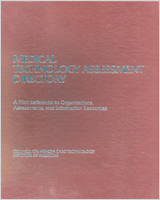NCBI Bookshelf. A service of the National Library of Medicine, National Institutes of Health.
Institute of Medicine (US) Council on Health Care Technology; Goodman C, editor. Medical Technology Assessment Directory: A Pilot Reference To Organizations, Assessments, and Information Resources. Washington (DC): National Academies Press (US); 1988.

Medical Technology Assessment Directory: A Pilot Reference To Organizations, Assessments, and Information Resources.
Show details1660 Duke Street
Alexandria, VA 22314
703-549-1500
Contact: Richard Kahn, Ph.D., Assistant Executive Vice President.
Overview: The American Diabetes Association (ADA) is a not-for-profit membership association that promotes efforts to prevent and cure diabetes and works to improve the well-being of people with diabetes and their families. It provides professional education programs, patient information materials/programs, research grant awards, and public awareness about diabetes. ADA's technology assessment activities include sponsoring consensus conferences, developing position papers, and publishing review articles.
Purpose: To provide health professionals and the public with accurate and comprehensive information about technologies relevant to diabetes.
Primary intended users: General public; people concerned about their health; patients; providers, generally; physicians; other care givers; health product manufacturers; health/medical professional associations; health industry associations; consumer associations; employers; unions and other employee organizations; third party payers; government regulators; voluntary associations, organizations; biomedical researchers; reporters, writers, news media; information/computer industry; labs, blood banks; public policy-makers, legislators; policy research organizations.
Technologies: Drug, device, medical or surgical procedure, support system, organizational or administrative system.
Intervention: Diagnosis, treatment, rehabilitation.
Stage: New, established or widespread practice.
Properties: Safety; efficacy; effectiveness; cost; cost-benefit; cost-effectiveness; service requirements; acceptance/adoption level; system impact; economic implications; ethical, legal, social implications.
Selection process: ADA board members and officers, professional members, and other agencies and institutions can request that an assessment be conducted. Written requests are submitted to the volunteer leadership or senior staff. The volunteer leadership sets the assessment topic priorities.
Methods: Information syntheses, expert opinion, group judgment, cost analyses.
The assessment process is conducted in committee meetings, symposia, and conferences. The approximate turnaround time from selection of assessment topic to reporting of findings is 6 months.
Assessors: The assessors have expertise in a wide variety of areas related to diabetes including medicine, nutrition, exercise, law, and public health.
Assessment reports include: The purpose of the assessment; relationship of this assessment to prior or concurrent assessments of the technology or other technologies intended for similar purposes; who conducted the assessment; description of the technology; properties assessed; procedure used for the assessment; sources of data/ information; methods for collecting data/information; methods for analyzing/synthesizing data/information; results; findings or conclusions; limitations of findings; implications of findings for practice; recommendations for practice, future assessments, technology development, research; how the technology works, including theory, principles; development of the technology; coverage/reimbursement status of the technology.
Dissemination: Printed reports; journal articles; advisories to members/constituents; press conferences/news releases; TV/radio broadcasts, video products.
The ADA accepts telephone and written requests for copies of assessment reports.
Budget: $100,000. The approximate cost per assessment ranges from $1,000 to $50,000. Funding sources: 5 percent government grants/contracts; 15 percent foundations, other private grants; 80 percent sponsors/members dues, contributions.
Use: The ADA uses the assessment reports and position statements as a guide for new program development and as an authoritative source of information. Reports are cited in government documents, newspaper articles, lay public magazines, and other publications.
Related activities: The ADA conducts an annual scientific session at which hundreds of original research reports are presented. The Association sponsors an annual postgraduate course, a research symposium, and other conferences intended to disseminate new information or to provide a forum for discussing important topics related to diabetes.
Completed Reports
AL1 American Diabetes Association, Consensus Development Panel. Consensus statement on self-monitoring of blood glucose. Diabetes Care 1987; 10:95-99. [Expert opinion, Group judgment]
AL2 American Diabetes Association, Task Force of the Council on Nutrition Sciences and Metabolism. Position statement on use of noncaloric sweeteners. 1987. [Expert opinion, Group judgment]
AL3 American Diabetes Association. Nutritional recommendations and principles for individuals with diabetes mellitus. Diabetes Care 1087;10:126-132. [Expert opinion, Group judgment]
AL4 American Diabetes Association and the Centers for Disease Control, Task Force on Financing Quality Health Care for Persons with Diabetes. Third-party reimbursement for diabetes outpatient education. 1986. [Expert opinion, Group judgment]
AL5 American Diabetes Association. Position statement on polydextrose. 1986. [Expert opinion, Group judgment]
AL6 ______. Bedside blood glucose monitoring in hospitals. Diabetes Care 1986;9:89. [Expert opinion, Group judgment]
AL7 ______ Gestational diabetes mellitus. Diabetes Care 1986;9:430-431. [Expert opinion, Group judgment]
AL8 ______. Continuous subcutaneous insulin infusion. Diabetes 1985;34:946. [Expert opinion, Group judgment]
AL9 ______. Office guide to diagnosis and classification of diabetes mellitus and other categories of glucose intolerance. Diabetes Care 1981;4:335. [Expert opinion, Group judgment]
AL10 Olefsky JM, Crapo P. [American Diabetes Association] Fructose, xylitol, and sorbitol. Diabetes Care 1980;3:390-393. [Expert opinion, Group judgment]
- American Diabetes Association - Medical Technology Assessment DirectoryAmerican Diabetes Association - Medical Technology Assessment Directory
Your browsing activity is empty.
Activity recording is turned off.
See more...